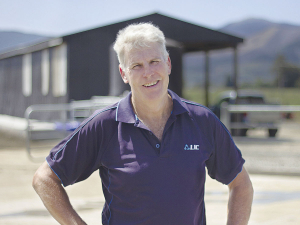LIC lifts half-year revenue on strong demand for dairy genetics
Herd improvement company LIC has posted a 5.2% lift in half-year revenue, thanks to increasing demand for genetics.
 Murray King, LIC chairman says the co-op faced Covid-related challenges and cost pressures last year.
Murray King, LIC chairman says the co-op faced Covid-related challenges and cost pressures last year.
LIC has announced a solid half-year result despite challenges posed by Covid.
The farmer-owned co-operative reported a net profit of $35.6 million, up 6.2% on last year.
Total revenue for the six months ending November 30, 2021 topped $169.4 million, up 5.4%.
LIC chairman Murray King says the board is pleased to present another strong result to farmer shareholders, particularly after a difficult period of Covid-19 restrictions and increasing cost pressures in the business.
"The LIC team worked hard to deliver a largely business-as-usual season to our farmers this season, despite our main bull farm and laboratories operating under the Level 3 Covid-19 restrictions that were in place in the Waikato for most of this period.
"Spring is the most important time of year for our farmers, and for LIC, when demand for our essential artificial breeding and herd testing service is at an all-time high.
"I want to thank our farmers for trusting us to continue to deliver to them during this time."
King noted that the business has worked hard to manage costs.
"And we remain on track to deliver another strong result at year-end."
LIC's half-year result incorporated the majority of revenues from its core artificial breeding (AB) and herd testing services, but not a similar proportion of total costs, so are not indicative of the second half, nor the full year result. Revenue from international business, technology products and animal health testing is also spread through the year.
King says the half-year result was driven by more farmers investing in the co-op's premium artificial breeding (AB) products, where young, genomically-selected bulls are used to fast-track genetic gain and deliver more value on-farm through increased productivity and efficiency, including improved environmental efficiency.
This year, more than half 50.3% of total AB inseminations will be delivered by genomically-selected young bulls, up from 41.3% last year and 12.6% in 2016-17. Within that, more than 200,000 sexed semen straws will be despatched to farmers up from 110,000 last year, and 33,804 the year prior.
"With a focus on cow quality over quantity, we're seeing more farmer turn to high genomic BW (gBW) sires to help them meet climate targets and drive efficiency gains," says King.
LIC has invested more than $80 million in genomic science over the last 30 years. King said it passionately believes in its power to enhance herd improvement and the role it will continue to play in the future of the New Zealand dairy industry.
"Genomic selection now underpins our breeding programme and we're really proud of the value it is delivering on-farm."
Recently LIC shared the latest research with its farmers which reaffirms that genomics is the high-octane fuel that will help drive the next wave of productivity and efficiency gains for their cows.
"It's really encouraging to see that farmers that have predominantly been using LIC bulls over the last 10 years are achieving markedly higher rates of genetic gain in their herds than the industry average and seeing the benefit of our investment in genomics."
The divestment of its automation business was also completed, with products, services and staff now transitioned to Allflex Livestock Intelligence, a NZ-based business unit of MSD Animal Health.
The co-operative also continued investment in research & development projects, including a major research project that aims to be able to select for lower methane emitting dairy cows. Work to deliver on the improvement roadmap for MINDA, its cloud-based farm management softward, also continued.
New CEO
LIC bids farewell to Wayne McNee, who stepped down in November after eight years as chief executive.
Subsequently, David Chin, formerly LIC's GM operations & service was appointed as McNee's successor and started on 17 January.
"Wayne led the organisaton through a period of significant growth and development across all areas of the business while delivering strong shareholder returns, and LIC is a significantly beter company than when he started in 2013," says chairman Murray King.
"Wayne executed his duties to a high standard, setting strong expectations and operating with a high degree of professionalism. In turn, that level of performance has disseminated throughout the business, delivering strong financial results, including this half-year.
"We are confident David Chin's leadership, combined with his deep operational knowledge, energy and passion for delivering value to our farmers, will serve the co-op very well into the future."
The 5+ A Day Charitable Trust has launched a collection of affordable recipes designed to turn everyday vegetables into seasonal stars.
Jane Mellsopp has been confirmed as the new Government Appointee to the New Zealand Meat Board (NZMB).
To celebrate the tenth anniversary of its annual Good Deeds competition, Rabobank will give away $100,000 to improve rural community hubs, schools, clubrooms, and marae across New Zealand.
Agricultural and veterinary product supplier Shoof International has appointed Michaela Dumper as its new chief executive.
Federated Farmers is celebrating following the Government's announcement that young farmers will be able to use their KiwiSaver funds to buy their first home or farm.
The Meat Industry Association of New Zealand (MIA) today announced that Chief Executive Officer Sirma Karapeeva has resigned from the role.
OPINION: Staying with politics, with less than nine months to go before the general elections, there’s confusion in the Labour…
OPINION: Winston Peters' tirade against the free trade deal stitched with India may not be all political posturing by the…